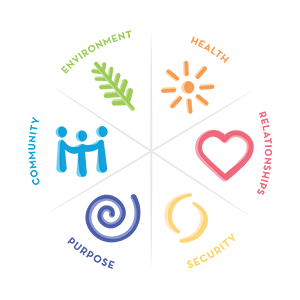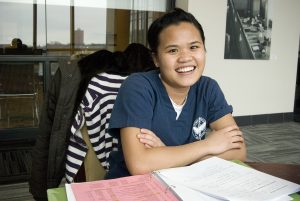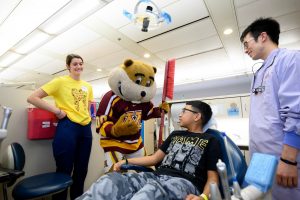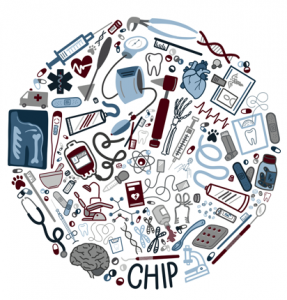5 Resources to Enhance Your Success
Resources
Shannon Gilligan Wehr
Learning Objectives
- Determine if you would benefit from seeking out help as you continue your education
- Identify any resources that might provide you with the support you need to succeed
- Engage with the identified resources as needed
In this section you will find numerous resources and services designed to help you be a successful student. We understand that it can be overwhelming to know everything that is available to you, so we encourage you to refer to this section whenever you are in need of assistance. If you do not know where to start or do not see a resource you are looking for, please reach out to Shannon Gilligan Wehr (gill0391@umn.edu) or Sara Johnson (john6461@umn.edu) in the Office of Student Affairs for help navigating your options.
Chapter Sections
- Wellbeing – resources for mental health and physical health
- Academic Success – Disability Resource Center, tutoring, and financial aid
- Involvement – student organizations, volunteering, and Center for Health Interprofessional Programs
- School of Dentistry Resources
- University Resources for Specific Populations – Office of Equity & Diversity Units, International Student & Scholar Services (ISSS), Student Parent Help Center, Mental Health Resources for BIPOC students, and University Veteran Services
- Advice From a Current Student
Wellbeing

Wellbeing is “a state of general contentment with life and the way things are. In this state we experience balance in body, mind, and spirit and feel connected to purpose, people, and community.”[1]
Overall wellbeing is important to your success as a School of Dentistry student. It is likely that you will not be able to maintain balance within all six areas throughout the duration of your studies. That is ok!
The University of Minnesota has numerous resources and services available to assist you in being a successful student and maintaining your overall wellbeing. In addition, the School of Dentistry provides student-centered learning and enrichment opportunities focused on your wellbeing.
Mental Health
As was mentioned in the Imposter Syndrome chapter, dental programs can be challenging. You might find yourself stressed, anxious, depressed, or nervous, at some point in your journey.
If you are ever in need of assistance, a great place to start is MentalHealth.umn.edu, which is the University’s comprehensive home to all things mental health. The site will connect you with on-campus services, such as Boynton Health Services’ Mental Health Clinic and Student Counseling Services, which offer individual and group counseling services. If you are looking for short-term support, check out Let’s Talk, which offers drop-in appointments. Black, Indigenous, and People of Color (BIPOC) mental health resources are also available to students.
“I have used the UMN Student Counseling Services to help me when I was adjusting to the new environment of both living in the Twin Cities while being far away from loved ones and also dealing with the higher workloads of dental school. The counseling services worked out very well for me and managed to get me through and now I have adapted much better to both my home and academic life. ” – Current School of Dentistry student
 Feeling Stressed? There are also a number of free stress relieving resources available to you, such as Pet Away Worry and Stress (PAWS), Stress Check-Ins, and Stress Busters – stress reduction classes.
Feeling Stressed? There are also a number of free stress relieving resources available to you, such as Pet Away Worry and Stress (PAWS), Stress Check-Ins, and Stress Busters – stress reduction classes.
The Center for Spirituality and Healing also offers a rotating schedule of mindfulness activities and resources. Many of their services are specifically designed to address the needs of students and staff in health care fields.
Please know the School of Dentistry and the University of Minnesota-Twin Cities support your mental health. If you are ever unsure of who to reach out to or where to go, do not hesitate to ask the Office of Resident & Student Affairs staff for assistance.
Physical Health
In addition to the Mental Health Clinic, Boynton Health Services also offers a full range of health services, including urgent care, quick clinic, immunizations, pharmacy, optometry, testing and diagnostics, health coaching, and more.
Recreation and Wellness enriches your campus experience and encourages lifelong wellbeing through group fitness classes, nine wellness facilities – including more than 300 cardio machines, strength training and cardio spaces, locker rentals, and outdoor and indoor fields, intramural sports, aquatics, adaptive programming, outdoor adventures, trainings, and more.
Food insecurity can be a real problem for some students. In fact, one in four student will experience or will be worried about a food shortage each month. If you are struggling to get enough to eat at any point, the Nutritious U Food Pantry is a great resource to explore. They provide fresh and healthy food to students that struggle to get enough to eat. Any student can visit the food pantry and no proof of need is required. Their website also includes links to other community food and nutrition resources.
Academic Success

The Disability Resource Center (DRC) works in collaboration with the University community to ensure access for all students. Students with disabilities may request accommodations to address barriers they anticipate or are presently experiencing through their office. If you think you will need assistance, it is recommended that you register with the DRC early, to ensure your needs are met prior to the start of classes. The DRC can also provide short-term accommodations for those experiencing unexpected illnesses, injury, medical situations, or other similar scenarios.
Maintaining strong academic standards are likely a top priority for you. As was previously mentioned in this ebook, it can sometime be challenging to adjust to new ways of learning and studying. In addition to the tips provided previously, we also encourage you to utilize the free tutoring services provided by the School of Dentistry. If you are interested in learning more about utilizing tutoring services, you can contact Shannon Gilligan Wehr (gill0391@umn.edu) in the Office of Student & Resident Affairs.
One of the more common concerns for School of Dentistry students is “how am I going to pay for school?” One Stop is a great resource to start with. They are able to assist you with understanding and adjusting your student loans, understanding how your cost of attendance is calculated, manage your student billing and account, as well as provide you guidance should any financial emergencies arise while you are a student. Liz Holm (holmx029@umn.edu) serves as the dedicated financial aid officer for School of Dentistry students. You are encouraged to reach out to her with any financial aid questions you might have.
Get Involved
 There are a number of ways that you can get involved as a dental student, including student groups and volunteer opportunities. Getting involved is a great way to expand you knowledge of the field, interact with other dental professionals, and enhance your resume.
There are a number of ways that you can get involved as a dental student, including student groups and volunteer opportunities. Getting involved is a great way to expand you knowledge of the field, interact with other dental professionals, and enhance your resume.
On the Student Intranet, under the Office of Student Affairs tab, you can find a listing of student groups and volunteer opportunities available to you as a student. Below are two videos and a quote about three of the many student organizations you could choose to be a part of.
 If you are looking to expand your knowledge of the health care field beyond the field of dentistry or make connections with other health care students, you may want to check out the Center for Health Interprofessional Programs (CHIP). CHIP offers health professional students exciting opportunities to connect, learn, serve, and lead with their peers across professions, through events, student organizations, and access to communal space for health professional students in the new state-of-the-art Health Sciences Education Center (HSEC). If you are a student parent, you may be interested in joining the Interprofessional Student-Parent Community (ISPC), coordinated through CHIP. More information about the ISPC and other student parent resources are available below.
If you are looking to expand your knowledge of the health care field beyond the field of dentistry or make connections with other health care students, you may want to check out the Center for Health Interprofessional Programs (CHIP). CHIP offers health professional students exciting opportunities to connect, learn, serve, and lead with their peers across professions, through events, student organizations, and access to communal space for health professional students in the new state-of-the-art Health Sciences Education Center (HSEC). If you are a student parent, you may be interested in joining the Interprofessional Student-Parent Community (ISPC), coordinated through CHIP. More information about the ISPC and other student parent resources are available below.
School of Dentistry Provided Resources
You are likely to find answers to many of your questions on the Student Intranet. This is an internal website specifically for School of Dentistry students, which includes information about academic, career planning, school policies and procedures, clinic resources, news, and more. You are encouraged to take a peek though it once you have access.
The Office of Student & Resident Affairs is a good place to start if you have questions, aren’t certain where to go for an answer, or if you need to get a away for a minute and grab a piece of candy. They are located in 15-106 Moos Tower. They provide a multitude of resources to students, including academic and career counseling, absence requests, verification of enrollment, wellbeing programming, tutoring, job postings, locker assignments and locks, scholarships, course evaluations, emergency funding, global exchange programs, and more. Please note, in-person services may not be available due to COVID-19 closures. Students are encouraged to reach out via email when the office is closed.
University Resources Focused on Specific Populations
The goal of the Office of Equity and Diversity is to create a welcoming and affirming climate to individuals and groups at the University of Minnesota who identify as American Indians and other indigenous populations, people of color, those with apparent and non-apparent disabilities, people who identify as women, those of various gender and sexual identities and expressions, as well as first-generation students from economically disadvantages backgrounds. There are a number of units within the Office of Equity and Diversity, including:
- Disability Resource Center, which promotes access through design of innovative learning, working environments, collaborative education, and partnership
- Gender and Sexuality Center for Queer and Trans Life, which focuses on developing and supporting more inclusive understandings of gender and sexuality
- Women’s Center, which advances gender equity across identities through education, empowerment, and advocacy
International Student & Scholar Services (ISSS) assists international students and scholars on F-1 (student), J-1 (student and scholar) visas in maintaining their non-immigrant status. They provide advising and counseling to foreign nationals about academic, immigration, legal, career, financial, personal and family issues, as well as cross-cultural adjustment and professional integration.
University Veteran Services is a resource for student veterans, service members, and their families. They provide assistance with grants, education benefits, GI Bill payments, VA resources, military leave, resources for transitioning to campus life, and more.
Student Counseling Services highlights mental health resources for Black, Indigenous, and People of Color (BIPOC) on their website. If you identify as BIPOC and are seeking mental health resources, you are encouraged to check out their website.
Student parents are served by the Student Parent Help Center, which provides support and advocacy for undergraduate, graduate, and professional-level students. Their services include advocating for campus-based lactation resources and family friendly practices, child care and family housing grants, community space, support groups, events and activities, and more.
Student parents are also encouraged to engage with the Interprofessional Student-Parent Community (ISPC), which is a student group made up of student parents in health professional programs. Below are two videos (part 1 and part 2) about how you could benefit from getting involved with ISPC. If you are interested in learning more about the ISPC or getting involved, you are welcome to reach out to Sunanda Baliga at balig010@umn.edu.
Please note, while the videos indicate the ISPC is a good resource for D1 students, the community is also open to Dental Hygiene and Dental Therapy students.
Benefits of the Interprofessional Student-Parent Community (ISPC) – Part 1
Benefits of the Interprofessional Student-Parent Community (ISPC) – Part 2
Advice from a Current Student
This video from current student, Kishore D., talks about mixing and matching activities, organizations, and resources to get the most out of your time at the School of Dentistry.
- https://www.takingcharge.csh.umn.edu/what-wellbeing ↵
